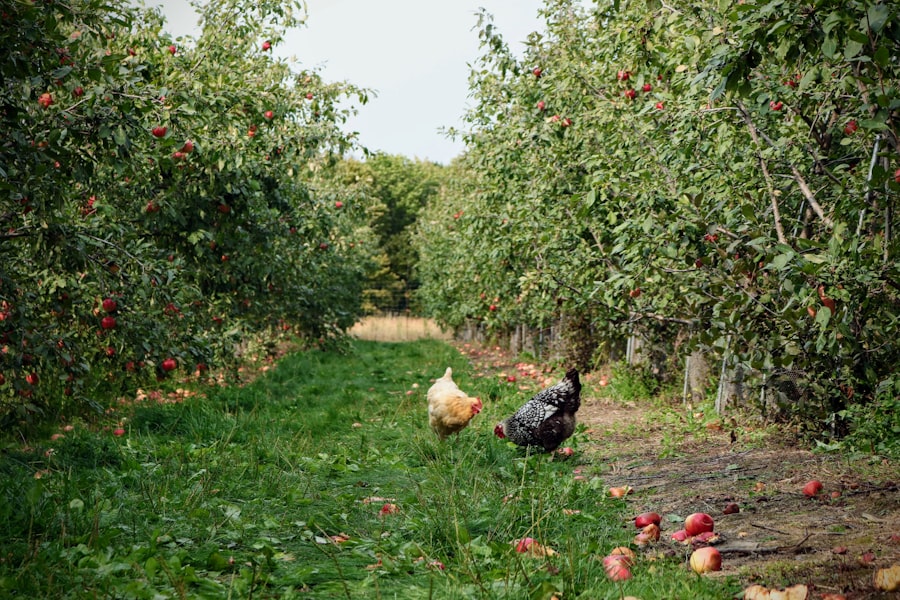Keeping chickens in your garden has become increasingly popular in recent years. Many people are drawn to the idea of having fresh eggs readily available and the joy of watching these feathered friends roam around their backyard. However, before you jump on the chicken-keeping bandwagon, it’s important to understand the laws and regulations surrounding this activity. Laws regarding keeping chickens in your garden can vary by location, so it’s crucial to do your research and ensure you are in compliance with local regulations.
Key Takeaways
- Laws regarding keeping chickens in your garden vary by location
- Permits may be required to keep chickens in your garden
- The number of chickens allowed in your garden may be limited
- Chicken coops in your garden must meet certain requirements
- Maintaining a clean and healthy chicken coop is important for responsible chicken keeping
What are the laws regarding keeping chickens in your garden?
The laws regarding keeping chickens in your garden can vary widely depending on where you live. Some cities and towns have specific ordinances that govern the keeping of chickens, while others may have no regulations at all. It’s important to check with your local government or zoning department to determine what rules apply to you.
Common laws and regulations regarding backyard chicken keeping include restrictions on the number of chickens allowed, requirements for a chicken coop, and guidelines for the location of the coop. Some areas may also have noise restrictions or rules about how far the coop must be from neighboring properties.
Do you need a permit to keep chickens in your garden?
Whether or not you need a permit to keep chickens in your garden depends on where you live. Some areas require a permit, while others do not. It’s important to check with your local government or zoning department to determine if a permit is required.
If a permit is necessary, the process for obtaining one will vary by location. Typically, you will need to fill out an application and pay a fee. The application may require information about the number of chickens you plan to keep, the size and location of your coop, and any other relevant details. Once your application is submitted, it will be reviewed by the appropriate department, and you will be notified if your permit is approved.
How many chickens are you allowed to keep in your garden?
The number of chickens you are allowed to keep in your garden will depend on the regulations in your area. Common limits range from three to six chickens, but some areas may allow more or fewer. It’s important to check with your local government or zoning department to determine the specific limits that apply to you.
In addition to the regulations, there are other factors that may affect the number of chickens you can keep. For example, the size of your lot may limit the number of chickens allowed. It’s important to consider these factors when planning your backyard chicken setup.
What are the requirements for a chicken coop in your garden?
A chicken coop is an essential part of keeping chickens in your garden. It provides shelter, protection from predators, and a place for the chickens to lay their eggs. The requirements for a chicken coop will vary by location, but there are some basic guidelines that apply in most areas.
First and foremost, a chicken coop should provide adequate protection from predators. This means it should be secure and have sturdy walls and a roof. It should also have proper ventilation to ensure good air circulation and prevent the buildup of moisture and ammonia.
Additionally, many areas have specific requirements for the size and design of a chicken coop. For example, some regulations may specify a minimum square footage per chicken or require certain features such as nesting boxes and roosting bars. It’s important to familiarize yourself with these requirements and ensure your coop meets them.
What are the dimensions of a suitable chicken coop for your garden?

The dimensions of a suitable chicken coop will depend on the number of chickens you plan to keep. As a general rule of thumb, each chicken should have at least 4 square feet of indoor space and 10 square feet of outdoor space. This means that if you plan to keep six chickens, your coop should be at least 24 square feet indoors and 60 square feet outdoors.
It’s also important to consider the height of the coop. Chickens need enough headroom to stand up straight and stretch their wings. A minimum height of 2-3 feet is recommended, but more is always better.
When planning the dimensions of your chicken coop, it’s important to consider future expansion. If you think you may want to add more chickens in the future, it’s a good idea to build a coop that can accommodate them.
What materials should be used to build a chicken coop in your garden?
There are several materials that can be used to build a chicken coop, each with its own pros and cons. The most common materials include wood, metal, and plastic.
Wood is a popular choice for chicken coops because it is readily available, easy to work with, and provides good insulation. However, it does require regular maintenance to prevent rotting and warping. It’s important to use untreated wood or wood treated with non-toxic preservatives to ensure the health and safety of your chickens.
Metal is another option for building a chicken coop. It is durable, easy to clean, and resistant to predators. However, it can be more expensive than wood and may require additional insulation in colder climates.
Plastic is a relatively new material for chicken coops but has gained popularity in recent years. It is lightweight, easy to clean, and resistant to rotting and warping. However, it may not provide as much insulation as wood or metal.
When choosing materials for your chicken coop, it’s important to consider your climate, budget, and personal preferences.
What are the guidelines for the location of a chicken coop in your garden?
The location of your chicken coop is an important consideration when keeping chickens in your garden. There are several guidelines that can help ensure the health and happiness of your chickens and minimize any potential conflicts with neighbors.
First and foremost, your chicken coop should be located away from neighboring properties. This will help prevent any potential issues with noise, odor, or pests. It’s also important to consider the direction of prevailing winds to minimize the impact of odors on your neighbors.
Additionally, your chicken coop should be located in an area that receives adequate sunlight. Sunlight is important for the health and well-being of your chickens and can help prevent the buildup of moisture and bacteria in the coop.
Finally, it’s important to consider the accessibility of your chicken coop. You should be able to easily access the coop for cleaning, feeding, and collecting eggs. It’s also a good idea to have a clear path from the coop to your house to make these tasks more convenient.
How to maintain a clean and healthy chicken coop in your garden?
Maintaining a clean and healthy chicken coop is essential for the well-being of your chickens and the prevention of disease. Here are some tips for keeping your coop in top shape:
1. Regularly clean the coop: Remove any droppings, soiled bedding, and debris from the coop on a regular basis. This will help prevent the buildup of bacteria and odors.
2. Provide fresh bedding: Replace the bedding in the coop regularly to keep it clean and dry. Good options for bedding include straw, wood shavings, or shredded paper.
3. Ensure proper ventilation: Good air circulation is crucial for preventing the buildup of moisture and ammonia in the coop. Make sure there are adequate vents or windows to allow fresh air to flow through.
4. Monitor for pests: Regularly check for signs of pests such as mites or rodents. If you notice any issues, take appropriate measures to eliminate them.
5. Provide clean water and feed: Make sure your chickens always have access to fresh water and feed. Clean their waterers and feeders regularly to prevent contamination.
6. Monitor the health of your chickens: Keep an eye on your chickens for any signs of illness or injury. If you notice any issues, consult a veterinarian for appropriate treatment.
Tips for keeping chickens in your garden legally and responsibly.
Keeping chickens in your garden can be a rewarding and enjoyable experience, but it’s important to do so legally and responsibly. Here are some tips to help you get started:
1. Research local laws and regulations: Before getting chickens, familiarize yourself with the laws and regulations in your area. This will help ensure you are in compliance and avoid any potential issues.
2. Obtain any necessary permits: If a permit is required in your area, make sure to obtain one before getting chickens. Follow the application process and pay any required fees.
3. Build a suitable chicken coop: Construct a chicken coop that meets the requirements of your local regulations. Consider the size, materials, and location of the coop to ensure the health and safety of your chickens.
4. Maintain a clean and healthy coop: Regularly clean the coop, provide fresh bedding, ensure proper ventilation, and monitor for pests to maintain a clean and healthy environment for your chickens.
5. Be a responsible neighbor: Consider the impact of your chickens on your neighbors and take steps to minimize any potential conflicts. Keep noise levels down, manage odors, and address any concerns that may arise.
By following these tips and doing your own research, you can enjoy the benefits of keeping chickens in your garden while being a responsible member of your community.
If you’re wondering about the best way to house your chickens in your garden, you might find this article on farmhouse chicken coops from Poultry Wizard helpful. It provides valuable insights and tips on how to create a comfortable and functional living space for your feathered friends. From choosing the right materials to designing the coop layout, this article covers everything you need to know. Check it out here for expert advice on creating the perfect chicken coop for your garden.
FAQs
What are the laws regarding keeping chickens in my garden?
The laws regarding keeping chickens in your garden vary depending on your location. It is important to check with your local council or government to find out the specific regulations in your area.
How many chickens am I allowed to keep in my garden?
The number of chickens you are allowed to keep in your garden also varies depending on your location. Some areas may have restrictions on the number of chickens you can keep, while others may not have any restrictions at all.
Do I need a permit to keep chickens in my garden?
In some areas, you may need a permit to keep chickens in your garden. It is important to check with your local council or government to find out if a permit is required in your area.
What are the benefits of keeping chickens in my garden?
Keeping chickens in your garden can have many benefits, including providing fresh eggs, natural pest control, and fertilizer for your garden.
What do I need to consider before keeping chickens in my garden?
Before keeping chickens in your garden, you need to consider factors such as the amount of space you have available, the type of chicken coop you will need, and the amount of time and effort required to care for the chickens.
What do I need to provide for my chickens?
To keep your chickens healthy and happy, you will need to provide them with a suitable chicken coop, food and water, and regular care and attention. You may also need to provide them with additional items such as nesting boxes and perches.
What are the potential drawbacks of keeping chickens in my garden?
Some potential drawbacks of keeping chickens in your garden include noise, odors, and the potential for attracting predators such as foxes or raccoons. It is important to consider these factors before deciding to keep chickens in your garden.
Meet Walter, the feathered-friend fanatic of Florida! Nestled in the sunshine state, Walter struts through life with his feathered companions, clucking his way to happiness. With a coop that’s fancier than a five-star hotel, he’s the Don Juan of the chicken world. When he’s not teaching his hens to do the cha-cha, you’ll find him in a heated debate with his prized rooster, Sir Clucks-a-Lot. Walter’s poultry passion is no yolk; he’s the sunny-side-up guy you never knew you needed in your flock of friends!







